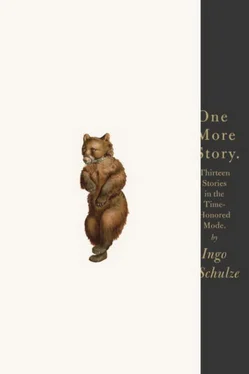Tears were running down Julia’s cheeks. We stood in the tiny entryway, listening to footsteps upstairs, to the click of a light switch, and to a very soft plop as one of her tears dripped on the floor.
She wasn’t blaming me, Julia said, she’d noticed herself that she had never been able to satisfy me sexually.
No, I shot back, that was nonsense.
We didn’t budge from the spot.
She wasn’t holding it against me, she said, some silly little slip that probably had nothing to do with love.
And then something happened that I still don’t understand even today. At that moment I thought of how I had wondered if I could live my life with Ute too. And instead of assuring Julia that the idea of my leaving her for someone else was absurd, I said that there’d been a smidgen of love involved.
Why did I lie? Because it was a lie — I swear, a lie!
Julia looked at me. “Well if that’s the case …,” she said. Her voice sounded strange. For the first time it sounded like the voice of a total stranger. She went back to the living room to get her purse. “If that’s the case …” were the last words I heard her speak.
On the way to the train station I showered her with declarations of love. I loved Julia, I loved only Julia and so never doubted that I could change her mind. I was certain that in the next instant we would embrace and kiss, that we would turn around and never be separated again. At the station, when Julia asked me for a cigarette, I thought the moment of saving grace, of awakening from the nightmare, had come.
Julia didn’t answer my letters. I traveled to A. to see productions she was in. She wouldn’t talk to me. She was sure I’d understand her someday, she said, thanked me for the flowers, and offered her hand. Her colleagues ignored me as if I were a stranger.
At first I thought Julia had put me on probation, but I didn’t hear from her either on New Year’s Eve or on January 13, my birthday. I started drinking, being alone was unbearable.
Almost everyone at the technical school had resigned their party membership. My senior adviser, Professor K., told everyone he could about the risk he had taken in preventing me from being discharged in early October. I spent most of my time in the office of the New Forum and until late into the night copied other people’s theses, advertising flyers, and various calls to arms. We asked that 10 percent of every bill be paid in Western D-marks. That was Ute’s idea, who headed up the business end of things. She was always there for me. I could also say she was at my beck and call, even though I was often mean to her. I couldn’t stand it when she treated me as if we were a couple.
We passed on two thousand marks a month to the New Forum, and kept the rest. That rest grew from week to week, so that every Saturday evening Ute slipped me several times the amount of my stipend.
But telling it this way leaves the wrong impression. At the time I was no more interested in money than I was in anything else. Moreover it only slowly dawned on us what it was we were actually up to. It was clear to Ute — although I didn’t give it a thought — that we were operating more or less illegally.
In the middle of March, the same week as parliamentary elections, she applied for a business license. We registered as a partnership under the civil code. As I said, I didn’t have to worry about any of it. I signed whatever she gave me to sign, and did my work — I didn’t want to have anything more than that to do with it. I lived in the expectation that at the first signal from Julia I would drop everything to follow her to wherever.
I gave up working on my dissertation. I was simply incapable of sitting there in my dorm and brooding. The reason I gave my parents was that all my advisers and mentors, including Professor Walther in Halle, had been given a leave of absence or fired.
Ute’s days at the polyclinic were numbered as well. We ran “Copy 2000” as a kind of hobby. I learned how to roll coins, carried the bag to the bank for Ute, and watched the numbers on our statements climb and climb. I made two more trips to A., but then decided never again to set foot in the town.
Because most people we had started with in the New Forum had wandered off into other political parties, no one except Ute and I knew who the machines — a second copier had been donated to us in December — actually belonged to. We moved them to a little shop at street level — Ute had arranged for an open-ended lease with People’s Solidarity starting July 1, 1990. Compared with the three copy machines we bought on credit, our old ones were already museum pieces.
From the start we were the top dogs in B. We never turned down a job and worked late into the night if necessary, whereas our competition got bogged down trying to make a killing in computers and other office equipment. We invested in binding machines.
Ute and I slept together almost every day, sometimes even had sex in the office as we waited for the copiers to spit out the rest of a run. In that regard we were made for each other. With Julia — maybe she was right about that — I’d always felt a little inhibited.
“We sure do a lot of screwing,” Ute once remarked. She said it the same way she might have said, “We sure do have a lot of business.” But she might have claimed just the opposite without it having sounded any different. Do you understand? I mean, for her the only important thing was that we were together. Without batting an eye Ute would have dropped everything on the spot to follow me through thick and thin. I’m not saying this out of vanity. It was the same with me, except for me it was Julia.
At the end of August, it was just growing light, Ute’s head lay on my chest and I was just about to doze off again, when she whispered: “I’m pregnant.” She hadn’t expected me to be happy about it. Fritz was born on February 28, 1991, he was named after Ute’s grandfather Friedrich. His middle, and last, name came from me, Friedrich Frank Reichert.
All the same Fritz was Ute’s child, hers alone. The boy didn’t change my life in any fundamental way. He helped reconcile me with my parents, who had long been upset with me for having given up on my dissertation. And it meant more work, although within a few weeks Ute was at my side again in the shop.
I soon avoided being alone with Fritz. In his mother’s presence, however, everything I said went in one ear and out the other. The older he grew, the more I irritated him — and at the same time the more devoted he was to his mother. Fritz turned on the charm for her in a way so unchildlike that it was almost worrisome.
Even before his birth we had hired employees. We used mainly students, who stood in line to get a job with us. But that’s taking me down the wrong track. It works perhaps as a kind of backstory. The ups and downs of our business are not the issue here. I was a really good boss, at least a better one than I am today — and I know what I’m saying. Back then people actually considered me a cool guy, and I probably was, too, when it came to business. I didn’t really want to be a success.
Do you understand? Nothing I did was done out of conviction. Nothing connected me with my work, it was just an accidental fit, with one thing leading to the other, as if in my worry and confusion I had landed in some parlor game.
Of course I could always have traveled to Berlin and rung Julia’s doorbell — she’d had a couple of minor roles at the Gorki Theater in 1991, but after that only jobs on off-off stages. But a visit seemed an inappropriate, random act — a far too simple solution somehow. I was hoping, if you want to put it that way, for fate to beckon — ultimately for Copy 2000 to go bankrupt. It sounds ridiculous now, but at the time I regarded Ute and myself as two people running a company, business partners who also happened to live together.
Читать дальше












